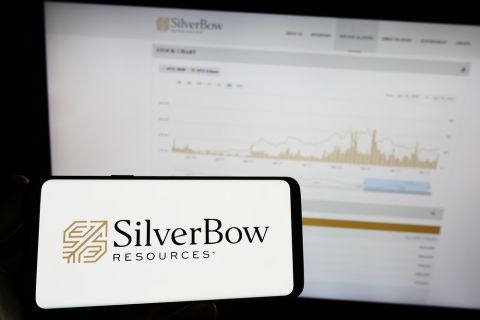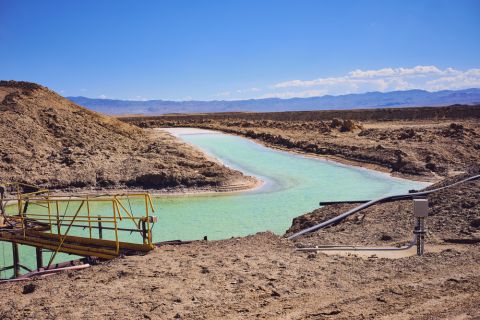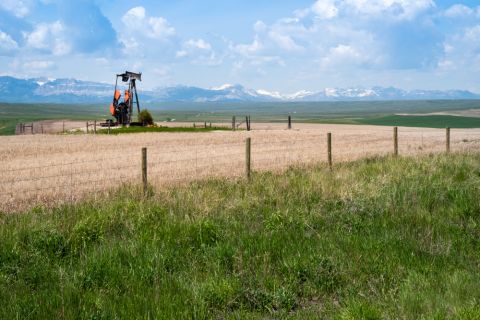Born in 1915, the youngest child of John D. Rockefeller Jr., David Rockefeller shares the lessons he learned from his grandfather and from his own personal experiences in a recently published autobiography, Memoirs (Random House), from which the following has been excerpted. David graduated from Harvard during the Depression, when the capitalist order that his grandfather helped to create was under attack. After studying at the London School of Economics and the University of Chicago, where he earned a doctorate, he served in the Army during World War II and then joined Chase bank in 1946, rising to the post of chairman and chief executive officer. He was a leader of the development that included the World Trade Center towers and resulted in the revitalization of southern Manhattan and its position as a world financial center. While at Chase, he supported the bank's patronage of modern art, an appreciation of which he had learned from his mother, Abby Aldrich Rockefeller, who was a founder of the Metropolitan Museum of Modern Art. The bank now has one of the world's largest collections of art outside of government- and museum-holdings. He has also served as an unofficial statesman. During a trip to the Middle East on bank business in the 1970s, he offered his services to the U.S. State Department, which asked him to visit Saddam Hussein in Iraq and return with a summary of the man who had taken control of the country. Rockefeller says Hussein told him that U.S. withdrawal of any involvement in Middle Eastern affairs would give him some interest in a diplomatic relationship. He showed Rockefeller how much interest: he held his thumb and index finger about one inch apart. Rockefeller retired from Chase in the 1990s and currently sits on many project and charity boards. He lives in New York City. Following is what he shares in Memoirs about his grandfather's ideas on capitalism, philanthropy and individualism. Grandfather had started at $5 a week as a clerk in a dry-goods store in Cleveland, and went on to found and run Standard Oil Co., which for all practical purposes was the oil industry in the U.S. until the Supreme Court ordered the trust dissolved in 1911 after a long period of acrimonious litigation. Many of the companies that emerged from the breakup still exist: ExxonMobil, Chevron and about 30 others. Standard Oil made Grandfather rich, possibly "the richest man in America." He was also, for much of his life, one of the most hated. The tabloid press attacked Standard's business practices and accused it of crimes-including murder-in its relentless efforts to eliminate all competition and perfect its monopoly of the oil industry. Grandfather was the target of Progressives, Populists, Socialists and others discontented with the new American capitalist order. Robert La Follette, the powerful governor of Wisconsin, called him the "greatest criminal of his age." Teddy Roosevelt used him as a whipping boy in his effort to bring the industrial monopolies to heel. Ida Tarbell, who through her writings probably did more than anyone to establish the image of Grandfather as a greedy and rapacious "robber baron," wrote: "There is little doubt that Mr. Rockefeller's chief reason for playing golf is that he may live longer to make more money." Today most historians would agree that the picture painted of Standard in those contemporary accounts was highly partisan and often inaccurate. Grandfather and his partners were tough competitors, but they were guilty of no more than the common business practices of their day. It was a different world then. Few of the laws that regulate business competition today were in place. Standard was operating on the frontiers of the economy; it was new, unexplored territory, in some cases literally like the Wild West. Muckrakers idealized the first years of the petroleum industry as some kind of entrepreneurial Eden. It was, in fact, exceedingly cutthroat. Prices gyrated wildly, with huge swings in production and alternating gluts and droughts of oil. Refiners and producers were bankrupted and driven out of business overnight. Grandfather was no romantic; he thought the situation was speculative, shortsighted and wasteful, and he set about to correct it in a tough-minded fashion. The accusations that Standard cheated widows of their inheritance, bombed rival refineries and drove competitors into ruin by any means available-all gleefully repeated by Tarbell and others-were absolute fiction. The real story is that Standard was considerably more honorable in its dealings than many of its competitors. During the process of consolidation, Standard offered not only an honest, but often a generous price for competing refineries-so generous, in fact, that competitors often reentered the business simply for the opportunity to be bought out again. Grandfather's partners complained bitterly about this persistent pattern of "blackmail," but he continued to buy in order to complete his plan. Standard was a monopoly. At its height it controlled 90% of the domestic oil industry and was trying hard to buy up the last 10%. Grandfather, however, never saw anything wrong with dominating the market, not only for the owners and workers in the industry, but for consumers and the country as a whole. This runs so contrary to textbook assumptions that many people find it hard to credit his sincerity on the matter. But as Standard's market share increased, the cost of petroleum products to the consumer-principally kerosene during Standard's first decades-dropped dramatically. Kerosene became universally available, and Standard's product was cheaper and better. The company invested in new technologies to improve the range and quality of its products and to develop new uses for byproducts that earlier had simply been poured onto the ground or dumped into the nearest river. Gasoline is the most obvious example of a waste product that eventually found a prime use in the internal-combustion engine and became the most valued petroleum product. It was Grandfather's policy to lower prices, believing that the less expensive the product, the more of it people would buy; and the larger the market, the more economies of scale Standard would be able to employ. Without having studied economics, he understood the meaning of "elastic demand." He always believed that it was good practice to "do a larger volume of business at a smaller profit per unit." Many economists talk of business as "responding to market demand;" but that isn't how Grandfather operated. He also created demand by setting up new channels of distribution at home and abroad. For instance, as a marketing device, Standard often gave away lanterns to ensure that consumers would buy kerosene to burn-much as Gillette gives away razors so that customer will continue to purchase razor blades. Grandfather drove his associates to buy refineries, to develop new oil fields, and to increase production long before demand existed. The modern corporation Standard acted most aggressively during economic downturns when others retreated, because Grandfather had a long-term vision of the industry and how it should be operated. A number of factors distinguished Standard from its rivals: a willingness to invest in new technologies, a constant concern for the cost of production and great attention to the marketing of its products. Grandfather successfully integrated within one cohesive organization the diverse elements of the industry from production at the wellhead to the final delivery to the customer. Standard was the first modern, fully integrated economic enterprise. That was Grandfather's greatest achievement: building the petroleum industry and, in the process, creating the modern corporation. It was an organizational triumph that transformed the business world. The American public welcomed the Supreme Court's dissolution of the Standard Oil Trust in 1911 with great acclaim. However, it should be remembered that the ultimate result of Grandfather's consolidation of the oil business was a cheaper, better and more reliable supply of petroleum that helped the U.S. make the transition from a decentralized, agrarian nation to a highly centralized industrial democracy. My father, who later had his own troubles with the press, used to describe with a kind of envy Grandfather's equanimity in the face of the storms raging against him. When Grandfather read the Tarbell book, he remarked to everyone's consternation that he "rather enjoyed it." In my view it was Grandfather's deep religious faith that gave him his placid self-assurance in the face of personal attacks, and supreme confidence that enabled him to consolidate the American oil industry. He was a devout Christian who lived by the strict tenets of his Baptist faith. His faith "explained" the world around him, guided him on his way through it and provided him with a liberating structure. The most important of these principles was that faith without good works was meaningless. That central belief led Grandfather to first accept the "doctrine of stewardship" for his great fortune and then to broaden it by creating the great philanthropies later in life. Grandfather was raised in modest circumstances in central New York State. William Rockefeller, his father, was something of an absentee parent and had a shady past, but his mother, Eliza Davison Rockefeller, who actually raised Grandfather and his siblings, was an extraordinarily devout and principled woman. In our secular age it is difficult for us to understand a life that was so governed by religious faith. For many, too, a life lived according to the strictures of the Baptist faith-no drinking, smoking or dancing-seems a painfully dour existence. But Grandfather wore the commandments of his religion, all the things that would seem to us such burdens, with ease and even joy. He was the least dour man I have ever known; he was constantly smiling, joking and telling shaggy-dog stories. Often at dinner he would start to sing softly one of his favorite hymns. He wasn't singing to anyone; it was as if a feeling of peace and contentment were welling out of him. Grandfather was a deeply religious man, but he never judged or condemned others who did not share his beliefs. As a teetotaler his entire life, Grandfather was a rarity at Standard, where most of his closest associates were anything but pious men. John Archbold, a onetime rival who became a close friend, was a very heavy drinker, and Grandfather made it a lifetime project to reform him. Grandfather formed intense friendships with his business partners, including Archbold, Henry Flagler, and his brother, William, who were with him from the earliest days at Standard. On the rare occasions when I heard him mention his business career, he spoke of the fun they had, despite the hard work and long hours, as confederates in a grand new enterprise. The art of giving The truth is that Grandfather found managing his fortune, which had reached almost $1 billion dollars by 1910, to be a problem. His annual income from Standard Oil and other investments was enormous, and given Grandfather's meticulous nature, it had to be spent or invested properly. Since he was uninterested in acquiring French chateaus or Scottish castles and was appalled at the idea of buying art, yachts or suits of medieval armor-all activities engaged in by his more extravagant contemporaries-Grandfather worked out a characteristic solution: He invested a good portion of his income in coal mines, railroads, insurance companies, banks and manufacturing enterprises of various kinds, most famously the iron ore business, and eventually controlled much of the rich Mesabi Range in Minnesota. But increasingly, after Grandfather retired from Standard in 1897, he occupied himself with a different form of investing: philanthropy, which he referred to as the "art of giving." In doing this he would have as profound an effect as he had with Standard Oil. From the time he was a young man just starting in business, Grandfather recorded every item of income and expense, including charitable donations of as little as a penny, in a series of ledgers, beginning with the famous "Ledger A," which are preserved in the Rockefeller Archive Center in Pocantico Hills. Keeping records became a family tradition. Father followed Grandfather's example and tried to have my generation do the same with varying degrees of success. And I tried it with my own children with even less success than Father. In doing this Grandfather was following the religious injunction to tithe, or give a tenth part of his income to the Church and other good causes. As his earnings grew, his charitable donations kept pace, usually reaching the tithe to which he had committed himself. By the mid-1880s, Grandfather found it difficult to handle charitable contributions by himself. It was, in fact, one of the chief causes of stress for him in those years. He felt obliged not only to give but to give wisely, which is a lot more difficult. "It is easy to do harm in giving money," he wrote. By then his annual income exceeded $1 million dollars, and disposing of just 10% of it was a full-time occupation. His eventual solution was to employ the Rev. Frederick T. Gates, a Baptist minister, to develop a more thoughtful and systematic way to assess the individuals and organizations who requested funds. Fortunately, Gates was a man with a broad education and considerable wisdom. Over the next several decades they planned the distribution of more than half of the fortune; most of the rest ultimately went to Father, who dedicated his life to carrying on and expanding their work. Some have said that Grandfather and Father, along with Andrew Carnegie, invented modern philanthropy. That may be true, but it may also claim too much. What the two of them did was emphasize the need to move charitable activities away from treating the symptoms of social problems toward understanding and then eliminating the underlying causes. This led them both to embrace a scientific approach and to support the work of experts in many fields. Grandfather's first major philanthropic project was the creation of the University of Chicago in the 1890s. It was only after the turn of the century, however, that Grandfather put his business cares behind him and devoted himself primarily to philanthropy. One of the first initiatives he undertook was the Rockefeller Institute for Medical Research, founded in 1901. Grandfather's vision, developed in close collaboration with Gates, my father, and the first director of the institute, Dr. Simon Flexner, was to establish a research facility modeled on the Pasteur and Koch institutes in Europe. In creating the institute Grandfather followed the same principles he had first tested at Standard Oil: He hired good men and gave them scope. While he had been intimately involved in the inception and planning, once the institute was up and running, he made it a point not to interfere with its management. He felt it appropriate to hand over the reins to the educators and scientists who were specialists in their field. Father became president of the board of trustees to ensure that the policy of independent scientific research was strictly maintained. The General Education Board, Grandfather's next major initiative, grew out of his desire to create a public education system in the South that would benefit blacks as well as whites. Grandfather provided the GEB with almost $130 million in endowment and operating funds during its 30-year existence. The GEB worked closely with local and state governments to achieve its goals. It is one of the first and most successful examples of public-private cooperation that our family has always promoted. The Rockefeller Foundation, founded in 1913, was the first philanthropic organization with a specifically global vision and the culmination of Grandfather's efforts to create a structure capable of wisely managing his assets for benevolent purposes. Grandfather provided more endowment for the foundation-approximately $182 million, more than $2 billion in present dollars, in a period of 10 years-than for any other institution. The foundation fought against hookworm, yellow fever, malaria, tuberculosis and other infectious diseases. In later years it became a leader in developing hybrid varieties of corn, wheat and rice that served as the basis for the Green Revolution, which has done so much to transform societies around the world. The charge has often been made that Grandfather's charitable giving was no more than a public relations ploy to burnish his image after a lifetime of rapacious profit-making. If that had really been his motivation, would he have needed to spend a half-billion dollars to achieve that end? Grandfather never breathed a sigh of remorse to my father, his grandchildren, or anyone else about his business career. He believed Standard Oil benefited society, and he felt comfortable with his role in creating it. What, then, explains Grandfather's philanthropy? In my view it flowed from his religious training and the experiences of his own life. Ida Tarbell and her intellectual descendants have chosen to picture Grandfather as the essence of greed and the epitome of selfish individualism. Grandfather was a strong individualist, but he defined the term differently. He rejected the idea of individualism as selfishness and self-aggrandizement. Instead, he defined individualism as the freedom to achieve and the obligation to return something of value to the community that had nurtured and sustained him. I believe this was both the source and object of his philanthropy. As for Father, far from being ashamed of Grandfather, he was immensely proud of him and his many achievements. If Father had conflicted feelings-and he did-they were that he didn't measure up. For much of his life my father, one of the greatest philanthropists in history, thought of himself as simply following in the footsteps of a greater man.
Recommended Reading
Kimmeridge Fast Forwards on SilverBow with Takeover Bid
2024-03-13 - Investment firm Kimmeridge Energy Management, which first asked for additional SilverBow Resources board seats, has followed up with a buyout offer. A deal would make a nearly 1 Bcfe/d Eagle Ford pureplay.
M4E Lithium Closes Funding for Brazilian Lithium Exploration
2024-03-15 - M4E’s financing package includes an equity investment, a royalty purchase and an option for a strategic offtake agreement.
Laredo Oil Subsidiary, Erehwon Enter Into Drilling Agreement with Texakoma
2024-03-14 - The agreement with Lustre Oil and Erehwon Oil & Gas would allow Texakoma to participate in the development of 7,375 net acres of mineral rights in Valley County, Montana.
California Resources Corp. Nominates Christian Kendall to Board of Directors
2024-03-21 - California Resources Corp. has nominated Christian Kendall, former president and CEO of Denbury, to serve on its board.
Uinta Basin: 50% More Oil for Twice the Proppant
2024-03-06 - The higher-intensity completions are costing an average of 35% fewer dollars spent per barrel of oil equivalent of output, Crescent Energy told investors and analysts on March 5.





